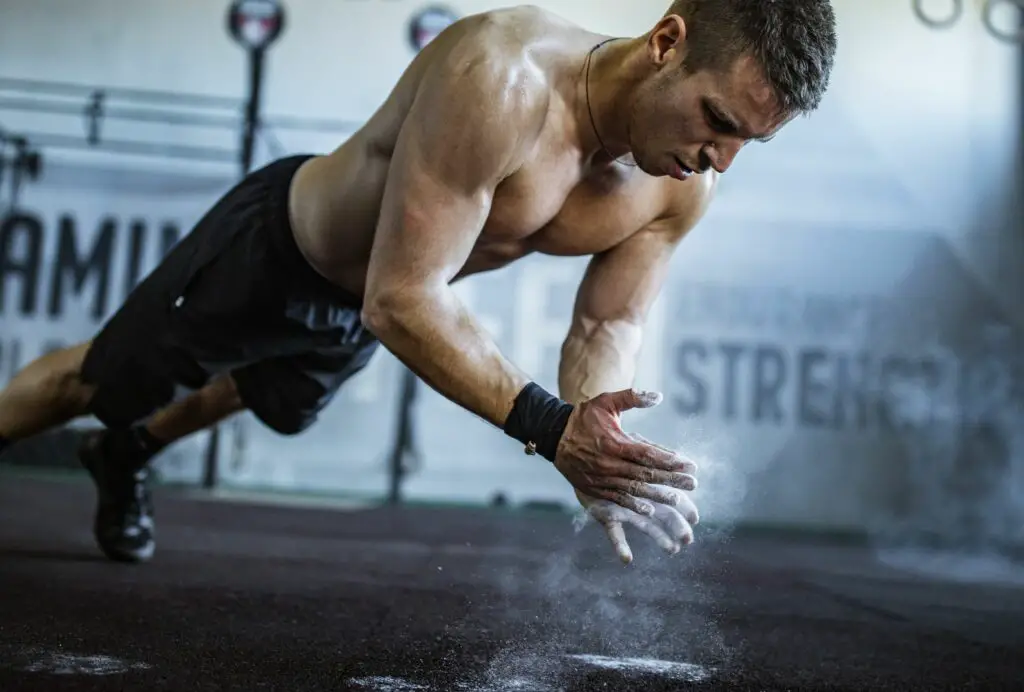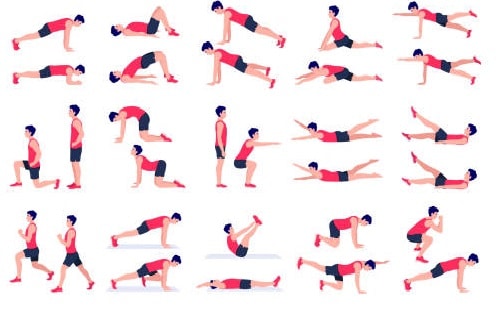
Bodyweight Exercises are a popular form of exercises that has gained popularity in recent years. It involves using your own body weight as resistance to build strength and endurance, without the need for equipment or weights. This form of training has become a favorite among fitness enthusiasts and athletes worldwide, as it is an effective way to achieve fitness goals and improve overall health.
What is Bodyweight Training?
Bodyweight training is a form of exercise that can be done anywhere, at any time. Whether you are in a gym or at home, all you need is your body weight to start. This means that you can easily incorporate it into your daily routine, without having to worry about traveling to the gym or purchasing expensive equipment. It is also a highly versatile form of exercise, allowing you to tailor your workout to your specific fitness level and goals.
One of the most significant benefits of bodyweight training is that it helps to improve overall strength and endurance. As you perform exercises that use your own body weight, your muscles are forced to work harder, leading to increased muscle strength and definition. Additionally, bodyweight training is an excellent way to improve cardiovascular health, as it raises your heart rate and helps to burn calories.
Bodyweight training is also highly effective for improving flexibility and balance. Many bodyweight exercises involve movements that require you to engage your core muscles, improving your overall stability and balance. Additionally, by incorporating stretching and mobility exercises into your bodyweight training routine, you can improve your range of motion and reduce the risk of injury.

In conclusion, bodyweight training is an excellent form of exercise that offers many benefits for people of all fitness levels. It is versatile, effective, and can be done anywhere, making it an excellent option for those who want to improve their health and fitness without the need for equipment or a gym membership. With the right approach and a little dedication, bodyweight training can help you achieve your fitness goals and improve your overall wellbeing.
Bodyweight Exercises
Incorporating bodyweight exercises into your fitness routine can help you build strength, improve flexibility, and increase overall fitness without the need for expensive gym equipment. Here are 15 of the best bodyweight exercises and the benefits they provide.

- Squats – Squats target the glutes, hamstrings, and quads, making them a great overall lower body workout.
- Push-ups – Push-ups work the chest, shoulders, and triceps, as well as the core.
- Lunges – Lunges target the glutes, hamstrings, quads, and calves, making them a great lower body exercise.
- Plank – The plank is an excellent exercise for strengthening the core and improving posture.
- Burpees – Burpees are a full-body workout that can improve cardiovascular health and burn calories.
- Mountain climbers – Mountain climbers are a great cardio exercise that targets the core, quads, and shoulders.
- Wall sits – Wall sits work the quads and glutes and are a great exercise for building leg strength.
- Glute bridges – Glute bridges work the glutes and lower back and can help improve posture and prevent lower back pain.
- Russian twists – Russian twists are a core exercise that targets the obliques and can improve balance and stability.
- Plank jacks – Plank jacks are a cardio exercise that targets the core and upper body.
- Bicycle crunches – Bicycle crunches work the core and obliques and can improve balance and coordination.
- Superman – Superman work the lower back and can improve posture and prevent lower back pain.
- Side planks – Side planks are a core exercise that target the obliques and can improve balance and stability.
- Jumping jacks – Jumping jacks are a full-body cardio exercise that can help improve cardiovascular health.
- Bear crawls – Bear crawls work the core and upper body and can improve coordination and agility.
Bodyweight exercises are also a great way to build muscle and burn fat without the need for expensive gym equipment. Plus, they can be done anywhere, making them a convenient option for people with busy schedules or limited access to a gym. So why not try incorporating some of these exercises into your next workout? Your body will thank you!
Benefits of Bodyweight Exercises
- Convenience: Bodyweight exercises can be done anywhere, whether you’re at home, in a park, or on vacation. You don’t need any equipment, so you can work out anytime, anywhere.
- Cost-effective: With bodyweight exercises, you don’t need to spend money on gym memberships, equipment, or personal trainers. This makes them a cost-effective way to stay fit.
- Versatility: Bodyweight exercises can be modified to suit different fitness levels, making them versatile and suitable for beginners and advanced exercisers.
- Increased flexibility: Many bodyweight exercises involve dynamic movements that can improve flexibility and mobility.
- Improved balance and coordination: Bodyweight exercises require you to use multiple muscle groups, which can improve balance, coordination, and overall athletic ability.
- Reduced risk of injury: Bodyweight exercises can be done with proper form, which can reduce the risk of injury. They also help to strengthen the muscles around your joints, which can further reduce the risk of injury.
- Increased calorie burn: Bodyweight exercises can be intense and require a lot of energy, which can increase calorie burn and promote weight loss.
In these bodyweight exercises it’s important to choose exercises that target all major muscle groups, including the upper body, lower body, and core. Additionally, it’s important to use proper form and to gradually increase the intensity and duration of your workouts to avoid injury.
Also Know
To get the most out of your bodyweight workout, consider creating a circuit or doing each exercise in a certain number of sets and reps. For example, you could do a circuit of squats, push-ups, lunges, and planks, doing each exercise for 30 seconds to a minute and repeating the circuit three to five times. Alternatively, you could do three sets of 10 to 15 reps of each exercise, resting for 30 to 60 seconds between sets.
It’s also important to challenge yourself and progress your workouts over time. This can be done by increasing the number of sets and reps, shortening your rest periods, or adding more difficult variations of each exercise.
Incorporating bodyweight exercises into your fitness routine can be an effective way to achieve your fitness goals, whether you’re looking to build strength, improve flexibility, or burn fat. With a little creativity and motivation, you can design a challenging and effective workout using nothing but your own bodyweight.
So next time you’re short on time or don’t have access to gym equipment, try incorporating some of these best bodyweight exercises into your workout. You may be surprised at how challenging and effective they can be.
Can you build muscle mass with bodyweight exercises?
Yes, it is possible. Bodyweight exercises can be an effective way to build strength and muscle when performed correctly and with the right progression.
To build muscle mass, you need to provide your muscles with enough stimulus to grow. This can be done by increasing the intensity of your bodyweight exercises over time, for example, by performing more challenging variations or increasing the number of repetitions or sets.
Bodyweight exercises also offer the benefit of engaging multiple muscle groups at once, which can help you build muscle mass more efficiently than isolated exercises.
Some effective bodyweight exercises for building muscle mass include push-ups, pull-ups, squats, lunges, dips, and burpees. Incorporating these exercises into a well-designed workout program and gradually increasing the difficulty can help you build muscle mass over time.
In addition to exercise, proper nutrition and recovery are also important for building muscle mass. Eating a balanced diet that provides enough calories and protein, getting enough rest and recovery between workouts, and staying hydrated can all support muscle growth and development.
In conclusion, bodyweight exercises can be an effective way to build muscle mass when performed correctly and with proper progression. By incorporating challenging bodyweight exercises into your workout routine, following a balanced diet, and prioritizing rest and recovery, you can achieve your muscle-building goals and improve your overall strength and fitness
Is bodyweight training effective for weight loss?
Yes, bodyweight training can be an effective way to support weight loss. Bodyweight exercises are great for building muscle, increasing your heart rate, and boosting your metabolism, all of which can help you burn calories and lose weight.
When you perform bodyweight exercises, you engage multiple muscle groups, which means you can burn more calories than with isolated exercises. Additionally, bodyweight exercises can be done in a circuit or with short rest periods, which can help keep your heart rate elevated and maximize calorie burn.
But while bodyweight exercises can be effective for weight loss, it’s important to keep in mind that weight loss also depends on your diet and overall lifestyle. To achieve sustainable weight loss, it’s important to maintain a healthy and balanced diet, get enough sleep, and manage stress levels.
In conclusion, bodyweight training can be an effective way to support weight loss, especially when combined with a healthy and balanced diet and lifestyle. By incorporating bodyweight exercises into your fitness routine and making healthy choices in all areas of your life, you can achieve your weight loss goals and improve your overall health and well-being.
Nutrition Tips that goes with bodyweight exercises

Nutrition and diet play an important role in supporting your bodyweight exercise routine. Here are some tips for developing a healthy diet that complements your bodyweight training:
- Eat a balanced diet: A balanced diet includes a variety of whole foods from all food groups, including fruits, vegetables, whole grains, lean proteins, and healthy fats. These foods provide your body with the essential nutrients it needs to fuel your workouts and support recovery.
- Stay hydrated: Adequate hydration is important for maintaining your energy levels, regulating your body temperature, and supporting muscle recovery. Aim to drink at least 8-10 cups of water a day, and more if you’re working out in hot and humid conditions.
- Time your meals around your workouts: Eating a meal or snack before and after your bodyweight workout can help provide your body with the fuel it needs for optimal performance and recovery. Aim to eat a balanced meal containing carbohydrates, protein, and healthy fats 2-3 hours before your workout, and a snack containing protein and carbohydrates within 30 minutes to an hour after your workout.
- Focus on nutrient-dense foods: Nutrient-dense foods provide a high amount of vitamins, minerals, and other beneficial nutrients for relatively few calories. Focus on incorporating nutrient-dense foods such as leafy greens, whole grains, lean proteins, and fruits and vegetables into your meals and snacks.
- Avoid processed foods and excess sugar: Processed foods and those high in sugar offer little nutritional value and can be detrimental to your health and fitness goals. Instead, aim to limit your intake of processed foods and added sugars and focus on whole foods.
In conclusion, a healthy and balanced diet that provides your body with the essential nutrients it needs can support your bodyweight exercise routine and help you achieve your fitness goals. By focusing on whole, nutrient-dense foods and staying hydrated, you can fuel your workouts and support your body’s recovery and repair processes.
Safety Precautions To keep In Mind For Bodyweight Exercises
While bodyweight exercises are generally safe, it’s important to take proper safety precautions to avoid injury. Here are some safety tips to keep in mind when performing bodyweight exercises:
- Warm up: Always start your workout with a proper warm-up to prepare your body for the workout ahead. This can include light cardio, dynamic stretching, and mobility exercises.
- Use proper form: Proper form is key to avoiding injury and getting the most out of your workout. Make sure you understand how to perform each exercise correctly and use proper technique throughout your workout.
- Progress gradually: Gradually increase the difficulty of your bodyweight exercises over time to avoid pushing yourself too hard and risking injury. Start with simpler variations of each exercise and gradually work your way up to more challenging versions.
- Listen to your body: If you feel pain or discomfort during an exercise, stop immediately and reassess your form. If the pain persists, stop the exercise and seek medical attention if necessary.
- Avoid overtraining: Overtraining can lead to injury and burnout, so it’s important to give your body adequate time to rest and recover between workouts. Aim to incorporate rest days into your routine and avoid working the same muscle groups two days in a row.
- Modify exercises as needed: If you have an injury or mobility issue that prevents you from performing an exercise correctly, modify the exercise or choose a different exercise that targets the same muscle group.
In conclusion, bodyweight exercises can be a safe and effective way to achieve your fitness goals when performed correctly and with proper safety precautions. By warming up, using proper form, progressing gradually, listening to your body, avoiding overtraining, and modifying exercises as needed, you can minimize your risk of injury and get the most out of your bodyweight workout.
Leave a Reply
You must be logged in to post a comment.